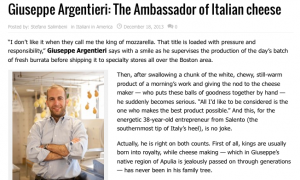 “I don’t like it when they call me the king of mozzarella. That title is loaded with pressure and responsibility,” Giuseppe Argentieri says with a smile as he supervises the production of the day’s batch of fresh burrata before shipping it to specialty stores all over the Boston area.
“I don’t like it when they call me the king of mozzarella. That title is loaded with pressure and responsibility,” Giuseppe Argentieri says with a smile as he supervises the production of the day’s batch of fresh burrata before shipping it to specialty stores all over the Boston area.
Then, after swallowing a chunk of the white, chewy, still-warm product of a morning’s work and giving the nod to the cheese maker — who puts these balls of goodness together by hand — he suddenly becomes serious. “All I’d like to be considered is the one who makes the best product possible.” And this, for the energetic 38-year-old entrepreneur from Salento (the southernmost tip of Italy’s heel), is no joke.
Actually, he is right on both counts. First of all, kings are usually born into royalty, while cheese making — which in Giuseppe’s native region of Apulia is jealously passed on through generations — has never been in his family tree.
In fact, when he came to America 15 years ago as a Lavazza coffee distributor (which by the way he still is), cheese making was not even remotely in his plans. “I was just a customer of Mozzarella House, this mom-and-pop cheese making facility in Everett with a little retail shop on the side,” he recalls. And a demanding and picky customer he was. “I would go there every week and complain with the owner when the product was not as good as usual. Sometimes I even had the arrogance to tell them how to make quality more consistent.”
In 2009, when the original owner — an Bostonian Italian American named Maria — began to speak of selling the business, he saw an opportunity to do something he had wanted to do for quite sometime.
“After years of selling Italian excellence made by others, I wanted to have a product of my own,” he recalls, adding, “as long as it was local — in terms of high-quality ingredients, of which this country is an endless source — and authentically Italian — in terms of production and know-how, for which this area of the country has an endless demand. It could have been pasta, bread, cakes … it happened to be cheese.”
He bought the business, initially leaving it almost unchanged, the name included, while he ventured out to gain a basic knowledge of the craft, both in Italy and in America, including specialized college courses like the one he took at Cornell.
The level of quality he has achieved has allowed his cheeses — mozzarella, mostly, but also ricotta, scamorza and stracciatella — to hit the shelves of such gourmet shops as Formaggio Kitchen, Savenor’s and Salumeria Italiana, as well as a number of high-end restaurants and pizzerias. “People here generally understand and appreciate this kind of product,” he explains with a touch of pride, “which makes it easier in a way but harder in another – including when it comes competition.
Enjoying an annual growth rate of 20 percent despite the slow economy, he has emerged the state’s main cheese producer as well as the owner of the state’s largest cheese making facility, a half-million-dollar state-of-the-art operation he opened last May in Peabody where tons of milk are processed each week, he says.
Not by chance, he has been one of the main driving forces behind the fledgling Massachusetts Cheesemakers Guild, an association of more than 20 in-state producers aimed at promoting the local product in the face of stiff competition from more their established and visible counterparts in Vermont and Wisconsin. Among the guild’s goals is the opening of a retail store in Boston for the direct sales of cheeses produced by the members. In the meantime, Giuseppe plans to boost sales to the public by opening a small retail shop next to his Peabody facility.
“There is nothing better than selling something you love,” Giuseppe explains, admitting with a sparkle in his eyes to being an avid consumer of his own product: “I serve it on my family’s dinner table at least twice a week, and I make sure my friends get a steady supply of it, too. It is the best and most pleasant form of quality control.
“And even more pleasant,” he concludes, “is the idea of doing my part, day in and day out, to promote Italian excellence in the world.”
So, he might not feel like or want to be called a king, but certainly he is doing his best to serve at least as an ambassador.
